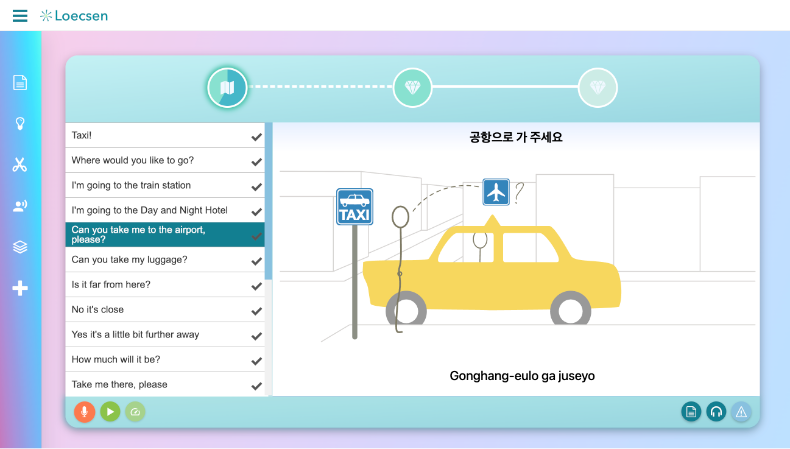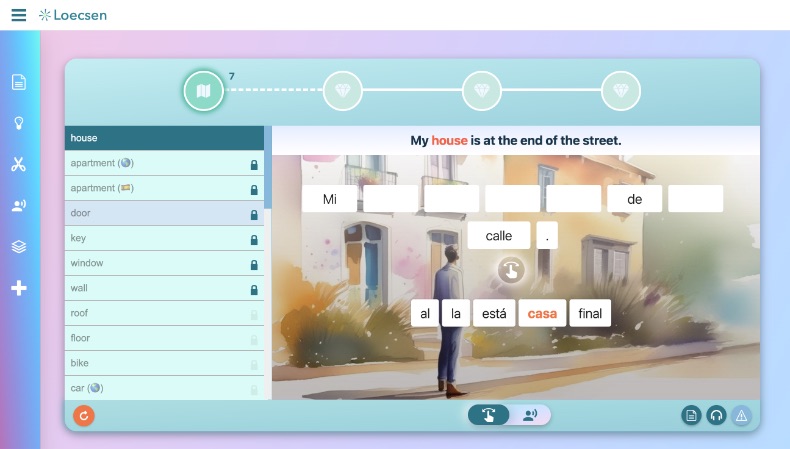Discover the method
Learn a language with Loecsen’s Super Memory method
A simple, effective method that leverages the brain’s natural mechanisms for language learning.

Choose your course
Planning a short trip abroad or moving to a new country for longer? Our courses give you exactly what you need to succeed in each of these situations.
First contact
Perfect to quickly memorize essential communication items, especially for travel contexts. The goal isn’t to learn the whole language, but to successfully take the first step.
Goal: CEFR A1 level
Fluent in 6 months
Ideal to reach a conversation level that lets you feel comfortable in everyday exchanges. This course covers nearly 80% of common vocabulary and the key grammar concepts.
Goal: CEFR A2–B1 level
Next lessons
Once the course has started, simply click Next at the end of each step: you’ll be automatically guided to the following exercise. Because everyone learns differently, you’re free to organize your training as you like. You can also switch between the guided and free paths at any time—the guided path remains available and updates continuously based on your progress, even if you don’t follow it all the time.
Guided path
Your prefer to be accompanied step by step, from the first to the last lesson? Our method guides you automatically from one step to the next for a structured and reassuring learning experience.
Free path
Want to focus on specific chapters or build your own path? No problem—our method gives you total freedom to organize the learning experience that suits you best.
Test schedule
1 – Level tests
+3
First review
+7
Reinforcement
+16
Consolidation
+34
Stabilization
Our method integrates retrieval practice, which views testing as part of learning rather than mere validation. Combined with spaced memory, it strengthens retention by prompting your memory at strategic moments.
Concretely, each word goes through a series of spaced review tests scheduled over about 60 days after the first successful attempt: the first review after 3 days, a second review 7 days later, a third review after 16 days, and a final review 34 days later to ensure long-term retention. These reviews take the form of quizzes that both measure and strengthen your memory at the same time. Quizzes taken voluntarily outside these scheduled times do not count toward your official progression.
To master a topic of about 20 words, plan for ~15 sessions of 15 minutes over two months (≈ 4 hours in total).
2 – Intermediate tests
We’ve designed fast checks to reinforce memory at the right time or to verify that information is well encoded before promoting a word to the next level.
Catch-up Test
A few days late for a test? No worries—our algorithm accounts for the natural fading of memory over time and offers a quick check to help you catch up. If you answer correctly, you resume the normal cycle; if not, the word automatically returns to your upcoming learning priorities.
Consolidation Test
The best way to anchor a concept is to reactivate it shortly after learning. That’s why we schedule consolidation checks soon after training sessions, focusing only on the items you missed. This immediately strengthens weak points and increases long-term retention
3 – Super Memory tests
Super Memory tests are central to our method because they address a major cause of failure in language learning. We found that insufficient very-short-term consolidation creates blocks that discourage learners. You need to rework poorly assimilated items immediately. That’s why we built a funnel-shaped learning loop: after each exercise, only failed items are replayed until you reach 100% success. This focus ensures durable memorization and keeps your motivation high.
4 – Free tests
Our algorithm optimizes your study time, but you can still train outside scheduled sessions: every extra effort further strengthens your memory.
Advanced features
Speech Recognition
Our speech recognition is an experimental feature based on the Web Speech API. It currently works on about 70% of devices (Chrome on desktop, and Android + Chrome on mobile). It helps you improve pronunciation and answer speaking quizzes.
Information sheets
Want to know a word’s origin or usage? Curious about grammar or culture? Struggling with pronunciation or looking for synonyms? All this is available for each word. These sheets are a powerful companion tool to support memorization and clarify grammar patterns.
Feedback on answers
With our AI, you understand your mistakes and learn not to repeat them. It also highlights nuances between terms: you can give an answer different from the expected one, and if it’s correct, it will be validated—with an explanation of the differences.
Ready-made prompts to chat with an AI
Turn your knowledge into real conversations thanks to our ready-to-use prompts. They let you practice words and expressions in concrete situations.
Downloadable audio and printable lessons
Sometimes, it helps to step away from screens. All our content is available as printable PDFs and downloadable MP3s, so you can review anytime, anywhere.
Immersion mode
Simply listen to course content like a podcast, with your own settings. For example, play only target-language sentences without translations. If you understand everything after a few weeks, it’s a sign your level has already improved significantly.
4 neuroscience-based tips
Follow the tips below to make learning easier, faster, and more durable. We highly encourage you to apply them—they can genuinely transform how you learn languages.
Train daily
5–20 minutes every day beat a single long session.
Prioritize speaking over clicking
Speaking out loud engages your auditory and muscle memory.
Practice in real conditions
By testing your knowledge in realistic exchanges—for instance with ChatGPT—you’ll turn knowledge into reflexes.
Write to remembe
Your hands are your memory’s best ally: write difficult words on flashcards or sticky notes.
Ready to get started?
You now have everything you need to successfully learn a new language!
Start now
